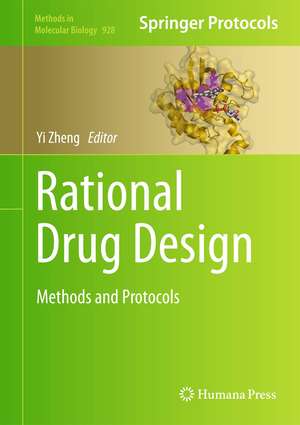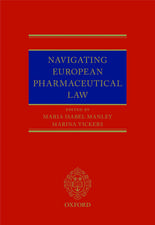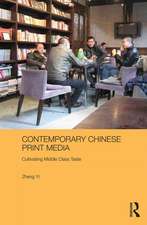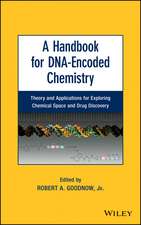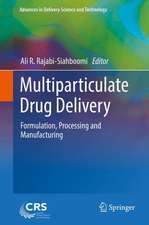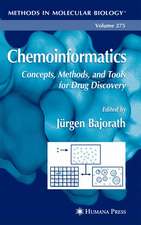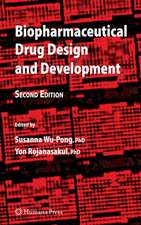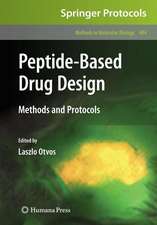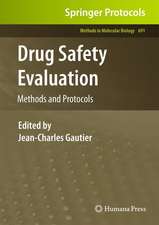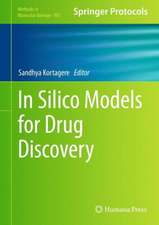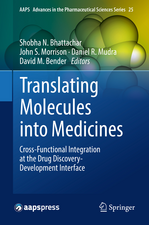Rational Drug Design: Methods and Protocols: Methods in Molecular Biology, cartea 928
Editat de Yi Zhengen Limba Engleză Hardback – 6 sep 2012
Authoritative and practical, Rational Drug Design: Methods and Protocols seeks to aid scientists in the further study of rational drug design and future drug discovery.
| Toate formatele și edițiile | Preț | Express |
|---|---|---|
| Paperback (1) | 899.28 lei 6-8 săpt. | |
| Humana Press Inc. – 23 aug 2016 | 899.28 lei 6-8 săpt. | |
| Hardback (1) | 723.57 lei 6-8 săpt. | |
| Humana Press Inc. – 6 sep 2012 | 723.57 lei 6-8 săpt. |
Din seria Methods in Molecular Biology
- 9%
 Preț: 791.59 lei
Preț: 791.59 lei - 23%
 Preț: 598.56 lei
Preț: 598.56 lei - 20%
 Preț: 882.95 lei
Preț: 882.95 lei -
 Preț: 252.04 lei
Preț: 252.04 lei - 5%
 Preț: 729.61 lei
Preț: 729.61 lei - 5%
 Preț: 731.43 lei
Preț: 731.43 lei - 5%
 Preț: 741.30 lei
Preț: 741.30 lei - 5%
 Preț: 747.16 lei
Preț: 747.16 lei - 15%
 Preț: 663.45 lei
Preț: 663.45 lei - 18%
 Preț: 1025.34 lei
Preț: 1025.34 lei - 5%
 Preț: 734.57 lei
Preț: 734.57 lei - 18%
 Preț: 914.20 lei
Preț: 914.20 lei - 15%
 Preț: 664.61 lei
Preț: 664.61 lei - 15%
 Preț: 654.12 lei
Preț: 654.12 lei - 18%
 Preț: 1414.74 lei
Preț: 1414.74 lei - 5%
 Preț: 742.60 lei
Preț: 742.60 lei - 20%
 Preț: 821.63 lei
Preț: 821.63 lei - 18%
 Preț: 972.30 lei
Preț: 972.30 lei - 15%
 Preț: 660.49 lei
Preț: 660.49 lei - 5%
 Preț: 738.41 lei
Preț: 738.41 lei - 18%
 Preț: 984.92 lei
Preț: 984.92 lei - 5%
 Preț: 733.29 lei
Preț: 733.29 lei -
 Preț: 392.58 lei
Preț: 392.58 lei - 5%
 Preț: 746.26 lei
Preț: 746.26 lei - 18%
 Preț: 962.66 lei
Preț: 962.66 lei - 23%
 Preț: 860.21 lei
Preț: 860.21 lei - 15%
 Preț: 652.64 lei
Preț: 652.64 lei - 5%
 Preț: 1055.50 lei
Preț: 1055.50 lei - 23%
 Preț: 883.85 lei
Preț: 883.85 lei - 19%
 Preț: 491.88 lei
Preț: 491.88 lei - 5%
 Preț: 1038.84 lei
Preț: 1038.84 lei - 5%
 Preț: 524.15 lei
Preț: 524.15 lei - 18%
 Preț: 2122.34 lei
Preț: 2122.34 lei - 5%
 Preț: 1299.23 lei
Preț: 1299.23 lei - 5%
 Preț: 1339.10 lei
Preț: 1339.10 lei - 18%
 Preț: 1390.26 lei
Preț: 1390.26 lei - 18%
 Preț: 1395.63 lei
Preț: 1395.63 lei - 18%
 Preț: 1129.65 lei
Preț: 1129.65 lei - 18%
 Preț: 1408.26 lei
Preț: 1408.26 lei - 18%
 Preț: 1124.92 lei
Preț: 1124.92 lei - 18%
 Preț: 966.27 lei
Preț: 966.27 lei - 5%
 Preț: 1299.99 lei
Preț: 1299.99 lei - 5%
 Preț: 1108.51 lei
Preț: 1108.51 lei - 5%
 Preț: 983.72 lei
Preț: 983.72 lei - 5%
 Preț: 728.16 lei
Preț: 728.16 lei - 18%
 Preț: 1118.62 lei
Preț: 1118.62 lei - 18%
 Preț: 955.25 lei
Preț: 955.25 lei - 5%
 Preț: 1035.60 lei
Preț: 1035.60 lei - 18%
 Preț: 1400.35 lei
Preț: 1400.35 lei - 20%
 Preț: 817.30 lei
Preț: 817.30 lei
Preț: 723.57 lei
Preț vechi: 761.65 lei
-5% Nou
Puncte Express: 1085
Preț estimativ în valută:
138.46€ • 143.06$ • 115.18£
138.46€ • 143.06$ • 115.18£
Carte tipărită la comandă
Livrare economică 19 martie-02 aprilie
Preluare comenzi: 021 569.72.76
Specificații
ISBN-13: 9781627030076
ISBN-10: 1627030077
Pagini: 230
Ilustrații: XI, 230 p. 58 illus., 22 illus. in color.
Dimensiuni: 178 x 254 x 20 mm
Greutate: 0.61 kg
Ediția:2012
Editura: Humana Press Inc.
Colecția Humana
Seria Methods in Molecular Biology
Locul publicării:Totowa, NJ, United States
ISBN-10: 1627030077
Pagini: 230
Ilustrații: XI, 230 p. 58 illus., 22 illus. in color.
Dimensiuni: 178 x 254 x 20 mm
Greutate: 0.61 kg
Ediția:2012
Editura: Humana Press Inc.
Colecția Humana
Seria Methods in Molecular Biology
Locul publicării:Totowa, NJ, United States
Public țintă
Professional/practitionerCuprins
On Setting up and Assessing Docking simulations for Virtual Screening.-Virtual Ligand Screening Combined with NMR to Identify Dvl PDZ Domain Inhibitors Targeting the Wnt Signaling.-Rational Design of Rho GTPase Targeting Inhibitors.-Rational Design of Peptide Ligands Against a Glycolipid by NMR Studies.-A Combinatorial Strategy for the Acquisition of Potent and Specific Protein Tyrosine Phosphatase Inhibitors.-Identification of Allosteric Inhibitors of p21-Activated Kinase.-Using a Modified Yeast Two-hybrid System to Screen for Chemical GEF Inhibitors.-Random Mutagenesis of Peptide Aptamers As An Optimization Strategy for Inhibitor Screening.-A Screening Strategy for Trapping the Inactive Conformer of a Dimeric Enzyme with a Small Molecule Inhibitor.-Use of a Fluorescent ATP Analog to Probe the Allosteric Conformational Change in the Active Site of the Protein Kinase PDK1.-Affinity Purification of Protein Kinases that Adopt a Specific Inactive Conformation.-Determination of the Kinetics and Thermodynamics of Ligand Binding to a Specific Inactive Conformation in Protein Kinases.-Purification and Specific Assays for Measuring APE-1 Endonuclease Activity.-An in vitro Screening to Identify Drug Resistant Mutations for Target-directed Chemotherapeutic Agents.-Utilizing AntagomiR (anti-sense microRNA) to Knock Down microRNA in Murine Bone Marrow Cells.-Synthesis, Conjugation, and Labeling of Multifunctional pRNA Nanoparticles for Specific Delivery of siRNA, Drugs and Other Therapeutics to Target Cells.-Mouse Models for Tumor Metastasis.Rational Design of Peptide Ligands Against a Glycolipid by NMR Studies.-A Combinatorial Strategy for the Acquisition of Potent and Specific Protein Tyrosine Phosphatase Inhibitors.-Identification of Allosteric Inhibitors of p21-Activated Kinase.-Using a Modified Yeast Two-hybrid System to Screen for Chemical GEF Inhibitors.-Random Mutagenesis of Peptide Aptamers As An Optimization Strategy for Inhibitor Screening.-A Screening Strategy for Trapping the Inactive Conformer of a Dimeric Enzyme with a Small Molecule Inhibitor.-Use of a Fluorescent ATP Analog to Probe the Allosteric Conformational Change in the Active Site of the Protein Kinase PDK1.-Affinity Purification of Protein Kinases that Adopt a Specific Inactive Conformation.-Determination of the Kinetics and Thermodynamics of Ligand Binding to a Specific Inactive Conformation in Protein Kinases.-Purification and Specific Assays for Measuring APE-1 Endonuclease Activity.-An in vitro Screening to Identify Drug Resistant Mutations for Target-directed Chemotherapeutic Agents.-Utilizing AntagomiR (anti-sense microRNA) to Knock Down microRNA in Murine Bone Marrow Cells.-Synthesis, Conjugation, and Labeling of Multifunctional pRNA Nanoparticles for Specific Delivery of siRNA, Drugs and Other Therapeutics to Target Cells.-Mouse Models for Tumor Metastasis.
Recenzii
From the reviews:
“This book covers some of the tools and techniques involved in rational drug design with a series of case studies designed to act as a compendium of methods and protocols intended for readers to adopt or modify. … The book would therefore make interesting reading to any student or investigator looking to gain a wider appreciation of strategies and activities across different disciplines or unfamiliar projects in the early drug discovery phase as well as the primary target audience of organic/medicinal chemists and molecular biologists.” (Stefan Kavanagh, BTS Newsletter – The British Toxicology Society, Issue 43, Winter, 2013)
“This book covers some of the tools and techniques involved in rational drug design with a series of case studies designed to act as a compendium of methods and protocols intended for readers to adopt or modify. … The book would therefore make interesting reading to any student or investigator looking to gain a wider appreciation of strategies and activities across different disciplines or unfamiliar projects in the early drug discovery phase as well as the primary target audience of organic/medicinal chemists and molecular biologists.” (Stefan Kavanagh, BTS Newsletter – The British Toxicology Society, Issue 43, Winter, 2013)
Textul de pe ultima copertă
Over the past three decades there have been new developments in therapeutic drug design. In Rational Drug Design: Methods and Protocols, expert researchers in the field detail many of the methodologies used to study rational drug design. These include methods such as virtual screening of chemical hits, rational lead discovery by high throughput screening, combinatorial and fragment based lead generation, peptide based drug discovery, and animal models of lead validation. Written in the highly successful Methods in Molecular Biology™ series format, chapters include introductions to their respective topics, lists of the necessary materials and reagents, step-by-step, readily reproducible laboratory protocols, and key tips on troubleshooting and avoiding known pitfalls.
Authoritative and practical, Rational Drug Design: Methods and Protocols seeks to aid scientists in the further study of rational drug design and future drug discovery.
Authoritative and practical, Rational Drug Design: Methods and Protocols seeks to aid scientists in the further study of rational drug design and future drug discovery.
Caracteristici
Aids scienctist in further study of rational drug design Provides step-by-step detail essential for reproducible results Contains key notes and implementation advice from the experts Includes supplementary material: sn.pub/extras Includes supplementary material: sn.pub/extras
